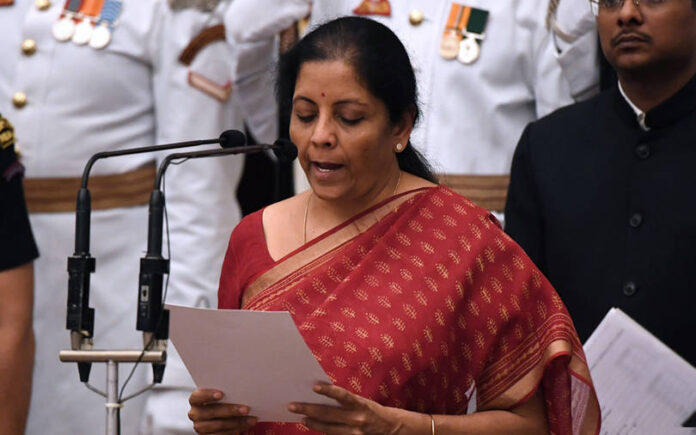PANAJI: India’s government slashed corporate taxes on Friday, giving a surprise $20.5 billion break aimed at reviving private investment and lifting growth from a six-year low that has caused job losses and fueled discontent in the countryside.
Finance Minister Nirmala Sitharaman told reporters the effective corporate tax rate would be lowered to around 25pc from 30pc, which she said would put it on a par with Asian peers.
Starting from the current fiscal year, any domestic company has the “option to pay income tax at the rate of 22pc” as long they do not seek any special tax incentives, the minister said in the western city of Panaji where officials are also considering lowering sales tax on 20-25 products.
The effective corporate tax rate for companies will be around 25pc, inclusive of surcharges, she said.
She lowered effective corporate tax further for domestic firms incorporated on or after Oct 1 to 17pc, with the condition that they begin production by March 2023.
Foreign firms that have Indian subsidiaries or joint ventures partnerships with Indian companies can also get the lowered corporate tax rates, Sitharaman said.
Prime Minister Narendra Modi, under pressure to make good on a promise to deliver growth and tens of thousands of jobs, said the new rates would spur investment including his signature program to boost domestic manufacturing.
“The step to cut corporate tax is historic. It will give a great stimulus to #MakeInIndia, attract private investment from across the globe, improve competitiveness of our private sector, create more jobs and result in a win-win for 1.30 billion Indians,” he said on Twitter.
The new corporate tax rate for domestic companies, excluding surcharges, makes India more competitive than neighboring Bangladesh, where the textile industry is growing, but slightly less attractive than Vietnam, which has wooed businesses affected by the US-China trade dispute, according to data compiled by Deloitte.
‘VERY BOLD’
Reserve Bank of India Governor Shaktikanta Das said the moves augur “extremely well” for the economy.
“These are definitely very bold and welcome measures,” he said at a forum. “These tax rates take us closer to the tax rates which prevail in this part of the world.”
Indian shares surged more than 6pc and were set for their best day in more than a decade after the government announced the tax cuts to revive flagging growth in Asia’s third largest economy.
The rupee INR=D4 rose as much as 0.9pc to 70.68 against the dollar, its strongest level since Aug 9.
“This is bigger (news) than last 20 budgets,” said Samir Arora, fund manager at Helios Capital said in a tweet.
India’s annual economic growth fell to a 25-quarter low of 5pc in April-June period.
Uday Kotak, head of Kotak Mahindra Bank KTMS.NS, said on Twitter that reducing corporate tax rate to 25pc is “big bang reform … It signals that our government is committed to economic growth and supports legitimate tax abiding companies. A bold, progressive step forward.”
Companies in consumer finance, banks, and hotels that pay upwards of 32pc tax will have the maximum benefits, said Jimeet Modi, founder and chief executive officer of Samco Securities and Stocknote in Mumbai.
YIELDS SPIKE
While shares soared, bond yields spiked to a near three-month high on speculation that the government may have to borrow more to meet its expenditure needs for the year, as the measures will mean a revenue loss of 1.45 trillion rupees for the current year. The risk of missing its fiscal deficit target of 3.3pc increases significantly as tax revenue growth is already weak.
The 10-year benchmark bond yield rose to 6.84pc from 6.57pc before the finance minister’s announcements, while the rupee was trading at 70.91 to the dollar from 71.
“On one side is the reality that 1.45 trillion rupees is sacrificed. On the other side is the hope that it will be recovered through economic recovery,” said Mahendra Jajoo, head of fixed income at Mirae Asset Global Investments in India.
Modi was re-elected in May with a bigger majority, which stoked hopes of bold reforms to get growth going and staunch the loss of tens of thousands of jobs.
Some analysts are doubtful the new measures will drive consumer consumption, which has taken a hit.
“I am not sure how lower tax rates would incentives companies to increase capex, when the private consumption engine has lost steam,” said Rupa Rege Nitsure, chief economist of L&T Financial Services.
At present, key industries such as autos and construction have held back investments due to slumping demand.
“This is a significant move by India to reassure the business community that the Modi government is not hostile to their interests,” said Sadanand Dhume, a resident fellow at the Washington-based American Enterprise Institute. “But by itself it may not be enough to revive the investment climate.”




